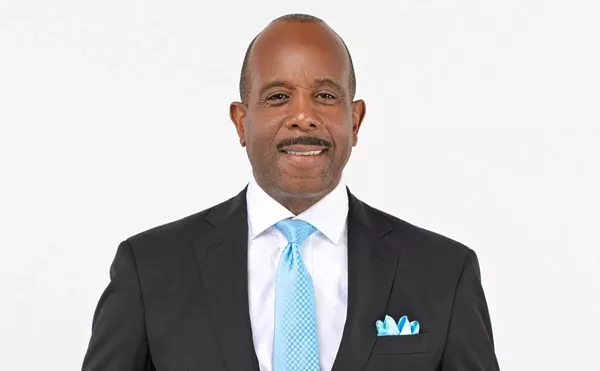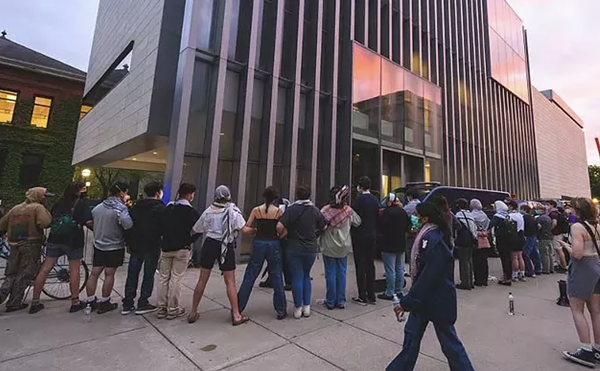
Audio By Carbonatix
[
{
"name": "GPT - Leaderboard - Inline - Content",
"component": "35519556",
"insertPoint": "5th",
"startingPoint": "3",
"requiredCountToDisplay": "3",
"maxInsertions": 100,
"adList": [
{
"adPreset": "LeaderboardInline"
}
]
}
]
As this is being written Monday, the Detroit City Council has just voted unanimously to override Mayor Kwame Kilpatrick’s veto of its spending plan for the next fiscal year.
That in itself is beyond remarkable.
For this council to act unanimously on deciding to take a potty break is practically unheard of. But for council members to vote 8-0 on a budget making the drastic cuts this one does to plug a $300 million hole — driving a hot poker into the eye of the unions that play such a key role in electing them — during an election year?
Like we said — beyond remarkable.
The same can be said of Kilpatrick’s threat to cancel the big fireworks in retaliation for the veto override. Remarkable in the sense that it is so completely infantile a response. Hey, Kwame, here’s a clue: We can survive a year without all the oohs and ahhs over things that go boom and sparkle in the night sky.
It’s fascinating, really. First you have Kilpatrick producing a budget that could be eligible for the Pulitzer Prize in fiction it’s so riddled with unrealistic expectations. Then the council surprises almost everyone, putting its legendary divisiveness aside to do the politically risky but responsible thing, overhauling Kilpatrick’s terribly flawed plan and drafting a budget that at least takes a serious step toward avoiding a state takeover of the city’s finances.
And then Kilpatrick has the unmitigated gall to accuse the council of playing politics.
Whether by design or luck, Kilpatrick, in producing a budget that balanced only on paper, has put himself in a position where he can blame the council for all the job cuts that will be coming down. You gotta give the guy points for chutzpah.
There are two questions at this point.
The first is, will voters buy that load of Kilpatrick crapola? Will they let him blame the council for attempting to do the right thing instead of going along with his fiscal flimflam? We’ll find out the answer to that one perhaps as early as August and certainly by November.
The other question is, will the city’s unionized workers agree to the massive concessions being asked of them? It is a crucial query because, despite all the cuts being made by the council, its budget, like Kilpatrick’s, assumes the unions are going to bite the bullet and do their part to save Detroit from financial ruin.
The real news in all this — the thing no one has really addressed at this point — is how bad things are going to get if the unions don’t accept $47 million in increased health care costs and a 10 percent pay cut in the form of Days Off Without Pay, or DOWOP.
Kilpatrick has already said that, on top of the job cuts either already implemented or outlined in his original budget, the council’s budget will result in the loss of more than 600 cops and more than 100 firefighters.
But if the unions continue to balk at making the concessions being asked of them, then the city is going to have to make another 1,500 to 2,000 job cuts. That info comes from Auditor General Joe Harris, who is appointed by council. Irvin Corley Jr., the council’s fiscal analyst, agrees with Harris’s prediction.
It’s either that or hello receivership.
City Councilwoman Sheila Cockrel says the council is confident the unions will concede, but she acknowledges that if concessions don’t happen, the only option is "draconian" reorganization of city government. Council President Maryann Mahaffey is vague about what will happen in the absence of union concessions: "The mayor has the responsibility of negotiations. If they don’t happen, then the mayor has to come in with amendments."
This is how Harris explains it: Of the city’s approximately 16,000 employees, close to 6,000 work in departments that produce revenue, like the Department of Water and Sewerage. That leaves about 10,000 positions in departments that don’t generate income, and that are wholly subsidized by the city’s general fund. Roughly 6,000 are public safety — more than 4,400 police and at least 1,700 firefighters, leaving about 4,000 civilian employees. Those are folks who pick up the garbage and bureaucrats who work in the city’s law, elections, information technology and legislative departments, among others.
However you slice it, cutting an additional 1,500 to 2,000 jobs at this point is a recipe for dysfunction.
And if the cuts aren’t made, then state intervention is inevitable. Talk about your Hobson’s choice.
But, if union leaders are to be believed, that’s the predicament we’re headed for.
"If all the city has to offer is pain, we’re not interested," says John Riehl, president of AFSCME Local 207, which represents Water and Sewerage Department workers.
Likewise, Detroit Police Officers Association President Marty Bandemer says he doesn’t support pay cuts.
"We are the most underpaid police officers in Michigan," Bandemer says. Negotiations with police, fire and municipal emergency medical services workers are governed by Michigan’s Public Act 312, which mandates arbitration for disputed contracts.
AFSCME Local 2920 President Emily Kunze says that for some workers, in the short term at least, it’s better financially to get laid off and collect unemployment than to take cuts as severe as those being asked for.
Given those statements, it’s hard to dispute Harris’ contention that the unions aren’t likely to make all the concessions being asked of them. Most city employees make between $25,000 and $40,000 a year. The increased payments for health care translate to roughly $250 a month for each worker. Add a 10 percent pay cut, Harris says, and the city’s lowest earners are losing $500 a month.
"It ain’t in my budget," Harris says. "And I make more than the average person."
Sometimes it’s to a union leader’s advantage to accept layoffs instead of a pay cut; at least the people you represent will still be making enough to keep a roof overhead and food on the table.
Or, as Michael Smith, director of Wayne State University’s Walter P. Reuther Library, says: "If you do not do well at the bargaining table, you may not be president next time around."
Ultimately, layoffs are the mayor’s decision. So, in theory, Kilpatrick could refuse to drop the ax. But if the concessions don’t come and layoffs don’t happen, council fiscal analyst Corley says, receivership would be one step closer.
Budget director Roger Short says he’s optimistic that negotiations with the unions will succeed.
If not, Harris says, there will be only one conclusion: "We’re screwed."
Send comments to NewsHits@metrotimes.com




